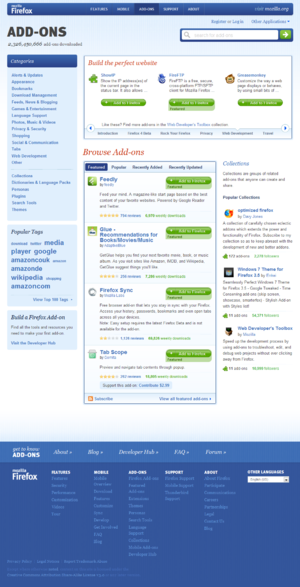Mozilla Add-ons
Type of site | Extension hosting |
|---|---|
| Owner | Mozilla Foundation |
| Created by | Andy McKay, Chris Howse, Gregory Koberger, Jeff Balogh, Jorge Villalobos (jorgev), Justin Scott (fligtar), Kumar McMillan, Matt Claypotch, Stephen Donner, Wil Clouser, et al.[1] |
| URL | addons |
| Commercial | No |
| Registration | Free; only needed for developers or for special features |
Mozilla Add-ons is the official Mozilla Foundation website to act as a repository for add-ons for Mozilla software, including Mozilla Firefox, Mozilla Thunderbird, SeaMonkey, and Mozilla Sunbird. These add-ons include extensions, themes, dictionaries, search bar "search engines," and plugins. Because of its addons.mozilla.org domain name, the site is informally also known as AMO.[2]
In contrast to mozdev.org which provides free hosting for Mozilla-related projects, Mozilla Add-ons is targeted to end-users, not just software developers. Many Mozilla applications contain direct links to the website, and contain settings to poll for updates to the extensions and the application itself.[citation needed] Firefox 3 includes features for retrieving and displaying content from the website in the add-on manager.[3]
On January 30, 2008, it was announced that over 600 million add-ons had been downloaded from the site and that over 100 million add-ons automatically check the site for updates every day.[4][clarification needed]
On July26, 2012, Mozilla announced that 3 billion add-ons were downloaded from the site.[5]
History
Formerly, Mozilla Add-ons was known as Mozilla Update (or UMO, as the hostname was update.mozilla.org). The site underwent several changes between its launch and when it became the AMO.[6]
- A major rewrite of the public pages was launched on April 4, 2006.
- A visual refresh of the Firefox pages was pushed on October 24, 2006 to correspond with the launch of Firefox 2 and the newly styled mozilla.com.
- A complete rewrite of both the developer and public pages, codenamed Remora,[7] was launched on March 23, 2007.
- Another visual refresh, "Remora 3.2", launched spring 2008.
- In 2011, Remora (written in PHP/CakePHP) was replaced with Zamboni (written in Python/Django).[8] The site also featured a redesign,[9] codenamed Impala.
References
- ^ "Site Credits". Mozilla Add-ons. Mozilla Foundation. Retrieved 16 February 2011.
- ^ "MozillaWiki: AMO Wiki". Retrieved 2008-07-07.
- ^ "Customizing your Firefox with add-ons: Acquiring add-ons". Retrieved 2008-07-07.[dead link]
- ^ "600,000,000 Add-on Downloads < Blog of Metrics". Blog.Mozilla.com.
- ^ "Firefox Add-ons Cross More Than 3 Billion Downloads!". The Mozilla blog. Retrieved 1 November 2013.
- ^ "MozillaWiki: AMO Roadmap". Retrieved 2008-07-07.
- ^ "MozillaWiki: Remora". Retrieved 2008-07-07.
- ^ "Traces of a new AMO".
- ^ "Previewing AMO's new look".

